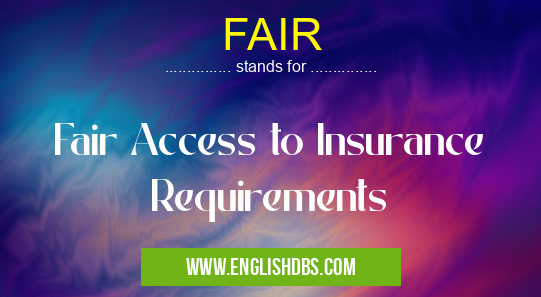What does FAIR mean in INSURANCE
Fair Access to Insurance Requirements (FAIR) is an insurance model developed in the United States that focuses on addressing the lack of affordable insurance coverage for certain individuals, families, and small businesses. The FAIR plan was established to provide these individuals and businesses with access to basic property and liability coverage at competitive rates. The FAIR Plan concept is unique in that it is designed to serve as a back-up option when other insurers are unwilling or unable to provide coverage.

FAIR meaning in Insurance in Business
FAIR mostly used in an acronym Insurance in Category Business that means Fair Access to Insurance Requirements
Shorthand: FAIR,
Full Form: Fair Access to Insurance Requirements
For more information of "Fair Access to Insurance Requirements", see the section below.
What FAIR Means
FAIR stands for Fair Access to Insurance Requirements. This is an insurance model designed specifically for low-income households, small businesses, and those who are underserved by other insurers due to their risk profiles. It provides basic property and liability coverage for these individuals at competitive rates. The aim of the FAIR Plan is to make sure that everyone has access to essential insurance protection regardless of their circumstances.
How FAIR Works
The FAIR plan works by pooling the risk associated with insuring more risky clients among insurers who are also involved in providing coverage for more traditional policies. This way, carriers can spread out any losses they may incur across a number of different policies instead of having them concentrated in one area. This approach also helps keep costs down by allowing insurers to offer lower premiums than they would otherwise have without the benefit of spreading out the risk associated with insuring higher-risk customers.
Advantages of Using FAIR
One of the main advantages of using a FAIR plan is that it ensures everyone has access to essential insurance protection regardless of their circumstances or income levels. It also helps protect insureds against potential gaps in coverages since all participating carriers are required by law to offer basic levels of protection across all lines of business written under this program. Furthermore, since each insurer shares the risk among all participating carriers, premiums tend to be more affordable compared to other types of policies available in the market today.
Essential Questions and Answers on Fair Access to Insurance Requirements in "BUSINESS»INSURANCE"
What is the Fair Access to Insurance Requirements (FAIR) plan?
The FAIR plan is a type of insurance program that ensures consumers access to basic property insurance coverage in areas where carriers won't offer coverage due to high risk.
How can I access the FAIR plan?
Consumers can access the FAIR plan through licensed home insurance agents and brokers who are authorized to offer FAIR plan products. You will need to provide information about your home, such as its age, construction type, location and other details.
What types of risks are covered by the FAIR plan?
The FAIR plan offers basic coverage for residential properties against certain risks including fire, windstorm, hail and vandalism. It does not cover flood damage or additional hazards such as earthquakes.
Are there any restrictions on who can purchase a policy under the FAIR Plan?
Yes, there are some restrictions on who qualifies for a policy under the FAIR Plan. Some restrictions include being denied coverage from at least two insurers or not being able to afford a policy from an insurer willing to cover your property.
Is it more expensive to buy a policy under the FAIR Plan?
Generally speaking, purchasing a policy through the FAIR Plan is more expensive than purchasing regular insurance since policies issued through this program have higher premiums. However, this may be necessary for individuals who cannot otherwise find insurance for their property.
Does the Fair Access to Insurance Requirements (FAIR) offer any discounts?
Unfortunately, there are no discounts available through the FAIR Plan but you can consider other options if you want more competitive pricing or prefer special features offered by regular insurers.
Will my rate increase after I purchase a policy from the Fair Access to Insurance Requirements (FAIR) Plan?
Rates are subject to change in line with market conditions and can go up or down depending on various factors such as inflation and claims experience. Your rate could potentially increase over time so it’s important that you review your policy regularly and take steps to reduce potential losses.
Can I cancel my Fair Access to Insurance Requirements (FAIR) Plan policy mid-term?
No it is not possible to cancel your Fair Access Policy mid-term unless you qualify for certain exceptions such as relocation or sale of your property - these exemptions vary depending on where your property is located so please contact an authorized agent directly for more information.
Final Words:
In conclusion, Fair Access to Insurance Requirements (FAIR) is an innovative insurance model designed specifically for low-income households, small businesses, and those who are underserved by other insurers due to their risk profiles. It provides basic property and liability coverage at competitive rates while helping protect insureds against potential gaps in coverages since all participating carriers are required by law to offer basic levels of protection across all lines written under this program.
FAIR also stands for: |
|
| All stands for FAIR |
